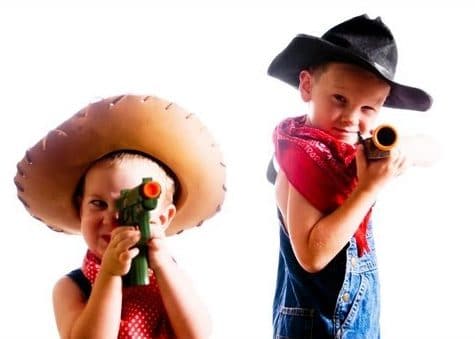The first time we encountered kids playing with toy guns, T was just three years old. He was instantly enthralled, trailing behind the bigger boys like a moth to a flame. I remember feeling stuck and helpless, the pacifist in me revolted by the shootout but, at the same time, completely clueless as to how to “parent” this particular moment. Eventually, I chose to redirect his play to another area of the playground, and hoped that that was the end of that.

How wrong I was. We hang out at playgrounds all the time, and more often than not, there’s always some sort of “gun play” going on. Whether it’s with squirt guns, Nerf guns, sticks, a juice box, or their fingers, when boys get together, an unseen, irresistible force compels them to start shooting each other.
Over the last couple of years, I’ve really struggled with this recurring play theme. On the one hand, I realize that kids are experiencing some new feelings of power and helplessness, and that gun play helps them make sense of those feelings. On the other hand, I think every parent’s worst fear is that their kid grows into a disturbed school shooter.
Despite my confusion, my gut does tell me that we should not ban this type of play. Doing so would only make it taboo, and thus, even MORE of a temptation. Yet, I’m not about to go out and BUY him a toy gun either. Aside from that, I was stumped. So, I turned to the experts for advice. Of the many parenting books on my shelf, this is what some had to say on the subject of gun play and “good guys” vs. “bad guys”:
Kim John Payne, author of Simplicity Parenting:
“It’s clear that boys will often make sticks or any manner of things into play weapons. That doesn’t concern me so long as the weapons are imaginary, and the play doesn’t physically harm anyone. However, fully detailed plastic assault rifles are a step beyond. Even if they don’t actually shoot, in their specificity and detailed singularity they seem to condone and even glorify violence. You may find studies to support either side of this issue, but I personally have no doubt that violent video games, movies, and television shows also negatively affect a child’s play, and their interaction with others.”
Lawrence J. Cohen, author of Playful Parenting:
“Toy guns, especially realistic ones, tend to restrict children into playing in very limited ways. What else can you do with a Star Wars Death Star besides blow up a planet? Yet when you get tired of making your cardboard tube into a light saber, you can make it a rocket or a conductor’s baton. When you get tired of your fake Uzi, you’re not likely to play a game of Mideast peace talks.”
“It is almost always better to join in with the play and transform it rather than to ban it. Keep it lighthearted by dying extravagant death scenes when the kid says ‘Bang bang, you’re dead,’ or introduce themes of nurturing (the army medic) and caring (the devoted soldier buddy) into the play.”
Another unique solution Cohen suggests is the “love gun.” As he explained to one child, who often turned to gun play to act out unresolved feelings of disconnect: “‘When I get shot with that gun, I just have to LOVE the person who shot me.’ And I opened up my arms wide and took a step toward him with a big, goofy, lovestruck grin on my face.” The boy’s reaction? Peals of giggles and delight.
Laura Davis and Janis Keyser, authors of Becoming the Parent You Want to Be:
“The idea of the ‘bad guy’ is pervasive in our world―in stories, movies, television, the way we approach problem solving. This can make it hard for children―and for us―to move beyond the myth of the ‘enemy.’ You can ask [your child]: What is a bad guy? How do you know he’s a bad guy? Was he a bad guy when he was a baby? What turned him into a bad guy? How could he change from being a bad guy into somebody else? Ultimately, through such interventions, you teach kids that there are people who DO unsafe or hurtful things, but that people aren’t magically or forever ‘bad guys.’”
With these pearls of wisdom, I’ve just begun to cobble together some sort of modus operandi for when gun play ensues:
- Follow the rules. Do not hurt, scare, or intimidate anyone. People can say, “No, don’t shoot me” and stop playing whenever they want. Some families have a rule stating you should never point a gun at a living thing, person or animal. Target practice is fine, but never shoot at something or someone living.
- Use imaginary guns/weapons only. This means NO toy guns―plastic, water, soft, colorful, realistic, or otherwise. DO allow guns or other “weapons” fashioned out of imagination, which have multiple uses (e.g., magic wands, walking sticks, shovels, etc.). Fingers, Legos, sticks, and blocks are all examples of implements which can be used as a gun one minute and serve a different purpose the next.
- Encourage compassion. When someone starts to look scared, stop playing and ask if they’re okay or if they’d like to play something else.
- Explain my own feelings and beliefs. No doubt T has picked up on my discomfort with any sort of gun play, even with pretend weapons. I have let him know that Mommy feels uncomfortable with gun play because of how real guns can hurt people.
- Explain how real guns work. This is entirely up to you, because it can open up a whole can of worms. But very early on, we explained to T that real guns can hurt or kill people. He nods and says he understands, but we’re still gauging to see how much of it sinks in….
By no means is this list the perfect solution. It morphs and molds according to the situation at hand. In fact, as I read my list and the experts’ recommendations above, I’m left with more questions than answers. (For example, how *exactly* do you get kids NOT to point guns at each other?? That’s all little boys seem to want to do!)
What do you think – is it okay to let kids play with toy guns? Other thoughts and strategies out there? What’s your family’s take on gun play? How do you recommend handling it?



